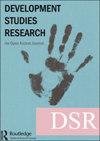金融发展对经济增长和收入分配的影响:来自中低收入和中高收入国家的经验证据
Q2 Social Sciences
引用次数: 5
摘要
金融发展及其与经济增长和收入不平等的关系最近受到了相当大的关注。本研究利用来自44个国家的数据,调查了金融发展与(一)经济增长之间的关系;(ii)经济不平等,使用来自42个中等收入国家的数据。通过面板自回归分布滞后(ARDL)模型获得了23年(1995-2018)的估计值。结果表明,从长远来看,金融发展有助于这两组国家的经济增长。然而,金融发展对经济增长的贡献在中上收入国家更为显著。此外,基于向量误差校正(VEC)的格兰杰因果关系检验表明,金融发展与经济增长之间存在双向格兰杰因果。调查结果显示,中低收入和中上收入国家的金融发展与收入不平等之间存在倒U型关联。这项研究可以帮助决策者制定加强金融系统的政策,从而促进经济增长和减少收入不平等。本文章由计算机程序翻译,如有差异,请以英文原文为准。
The effect of financial development on economic growth and income distribution: an empirical evidence from lower-middle and upper-middle-income countries
ABSTRACT Financial development and its relationships with economic growth and income inequality have recently received considerable attention. The present study investigates the relationships between financial development and (i) economic growth, using data from 44 countries; (ii) economic inequality, using data from 42 middle-income countries. Estimates are obtained through a panel Autoregressive Distributed Lag (ARDL) model for a period of 23 years (1995-2018). Results reveal that financial development contributes to economic growth in both groups of countries in the long run. However, the contribution financial development makes to economic growth is more noticeable in the case of upper-middle income countries. Additionally, Granger causality test based on Vector Error Correction (VEC) showed two-way Granger causality between financial development and economic growth. Findings disclosed an inverted U-shaped association between financial development and income inequality for both lower-middle income and upper-middle income countries. This study can aid policymakers in designing policies that can strengthen financial systems, thereby enhancing economic growth and reducing income inequality.
求助全文
通过发布文献求助,成功后即可免费获取论文全文。
去求助
来源期刊

Development Studies Research
Social Sciences-Development
CiteScore
3.20
自引率
0.00%
发文量
20
审稿时长
12 weeks
期刊介绍:
Development Studies Research ( DSR) is a Routledge journal dedicated to furthering debates in development studies. The journal provides a valuable platform for academics and practitioners to present their research on development issues to as broad an audience as possible. All DSR papers are published Open Access. This ensures that anyone, anywhere can engage with the valuable work being carried out by the myriad of academics and practitioners engaged in development research. The readership of DSR demonstrates that our goal of reaching as broad an audience as possible is being achieved. Papers are accessed by over 140 countries, some reaching over 9,000 downloads. The importance of the journal to impact is thus critical and the significance of OA to development researchers, exponential. Since its 2014 launch, the journal has examined numerous development issues from across the globe, including indigenous struggles, aid effectiveness, small-scale farming for poverty reduction, sustainable entrepreneurship, agricultural development, climate risk and the ‘resource curse’. Every paper published in DSR is an emblem of scientific rigour, having been reviewed first by members of an esteemed Editorial Board, and then by expert academics in a rigorous review process. Every paper, from the one examining a post-Millennium Development Goals environment by one of its architects (see Vandermortele 2014), to ones using established academic theory to understand development-imposed change (see Heeks and Stanforth 2015), and the more policy-oriented papers that contribute valuable recommendations to policy-makers and practitioners (see DSR Editor’s Choice: Policy), reaches a multidisciplinary audience.
 求助内容:
求助内容: 应助结果提醒方式:
应助结果提醒方式:


